The end of each year brings an inevitable onslaught of “best of” and “must read” lists.
It can be overwhelming, especially for library professionals trying to decide which titles to acquire and recommend for different readers. The perennial bestseller and influencer lists are often redundant, predictable, and cost-prohibitive for libraries and schools to acquire. They also don’t typically concern themselves with age-appropriateness, diverse reader interests, or availability to libraries and schools.
Luckily, we add new titles to Comics Plus every Wednesday, including a mix of new releases and backlist gems for every age and interest level. My colleague, Rob Randle, also spotlights his favorites every month.
As our in-house librarian, I’m responsible for curating our featured lists, and am fortunate to be able to explore a wider range of comics, manga, and picture books than most librarians and educators have time to — and I can’t help but have some personal favorites of my own along the way! For our first-ever unofficial “Best of…” list, I’m thrilled to present my top six picks that were added to Comics Plus this year, spanning across all of our age ranges.
And, since selecting only six was like choosing between my children, I’ve added some honorable mentions for each one — unrelated and not necessarily added in 2024, but for similar age levels — to maximize your discovery and readers advisory opportunities. Read all the comics!
Young Readers
The Great Grrrrr by Marie-Sabine Roger and Marjolaine Leray (Red Comet)
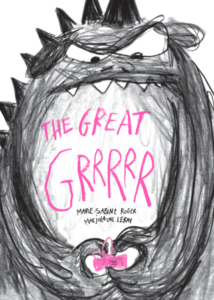 The Great Grrrrr is a big spiky monster who delivers packages for a living. One morning, a delivery attempt is thwarted when nobody answers the door, and Grrrrr is reduced to an impatient ball of frustrated monster, soaked by the rain and collapsed on the doorstep. His mounting angst quickly evolves into a temper tantrum that leads to him destroying the entire house. Of course, as soon as his outburst is over, an adorable elderly lady stands before him, grateful for the package. She lacks the eyesight to take in the damage to her home, and instead invites Grrrrr inside for hot cocoa in appreciation for his patience. The monster’s anger immediately gives way to remorse, and a very sweet, satisfying conclusion.
The Great Grrrrr is a big spiky monster who delivers packages for a living. One morning, a delivery attempt is thwarted when nobody answers the door, and Grrrrr is reduced to an impatient ball of frustrated monster, soaked by the rain and collapsed on the doorstep. His mounting angst quickly evolves into a temper tantrum that leads to him destroying the entire house. Of course, as soon as his outburst is over, an adorable elderly lady stands before him, grateful for the package. She lacks the eyesight to take in the damage to her home, and instead invites Grrrrr inside for hot cocoa in appreciation for his patience. The monster’s anger immediately gives way to remorse, and a very sweet, satisfying conclusion.
Everyone, from young children to the inner child inside every adult, can relate to Grrrrr’s emotional journey. We have all been impatient to the point of anger, and nobody likes being left standing out in the cold rain! Also in common with the target audience, Grrrrr is silly, relatable, and very sweet — once he gets his emotions in check! There is a lot to be learned about patience and how we handle big feelings, and the balanced tone will resonate with little people who are still learning to regulate emotions.
Leray’s illustrations pair a limited pink and black color palette with a child-like art style, easily inspiring a library or classroom drawing exercise. One possible activity could be a “design your own monster” challenge, with each child sharing their monster’s name and special abilities. This is the type of picture book I would’ve chosen to read for public library storytimes, as it is guaranteed to keep young audiences engaged and entertained.
- Comics Plus Collection(s): Elementary, Children’s Public Library, All-Access for Schools, Full Collection
Honorable Mentions
Bandit’s Imagination: Tub Trouble (Scout Comics); DIBS! (Lerner); Where’s My Tushy? (Lerner).
A Family Like Ours by Alice Lee, Frank Murphy, and Kayla Harren (Cherry Lake)
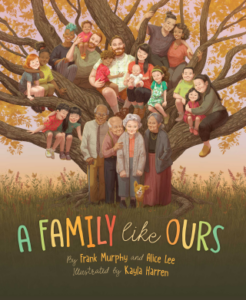 For many folks, the holiday season includes extra family time, but most children lack the life experience to clearly understand what family means. Some may wonder if their family is not “normal,” while others believe their particular family structure is the only type that exists. In A Family Like Ours, Lee and Murphy offer an insightful overview for young people in either category, explaining that, “hearing about each other’s families brings us closer together. And makes us realize our families are much more alike than they are different.” Not only does Harren’s artwork show what so many types of families look like, they explore why everyone needs some type of family unit, explaining that they provide us with a place to grow and thrive.
For many folks, the holiday season includes extra family time, but most children lack the life experience to clearly understand what family means. Some may wonder if their family is not “normal,” while others believe their particular family structure is the only type that exists. In A Family Like Ours, Lee and Murphy offer an insightful overview for young people in either category, explaining that, “hearing about each other’s families brings us closer together. And makes us realize our families are much more alike than they are different.” Not only does Harren’s artwork show what so many types of families look like, they explore why everyone needs some type of family unit, explaining that they provide us with a place to grow and thrive.
It’s a quick but beautiful exploration of family diversity, with a universal message that is conveyed both impactfully and tactfully, saving it from being heavy handed. A Family Like Ours is also bittersweet, explaining to young people that all “families”— including school teams, friend groups, and other chosen kin — will change over time, and most don’t last forever.
The picture book’s backmatter includes a note from the authors and illustrator about their examination of what makes a family: “No matter what your family looks like, it is good.” A charming, timely book to share year round, but particularly during the holiday season.
- Comics Plus Collection(s): Elementary, Children’s Public Library, All-Access for Schools, Full Collection
Honorable Mentions
Nina in That Makes Me Mad (TOON Books); Showtime for Flip-Flop (ABDO).
Middle Grade
Haru Book 1: Spring by Joe Latham (Andrews McMeel)
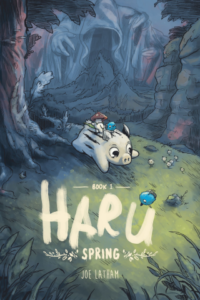 For a little bird named Haru, their younger sibling Goose, and their boar bestie Yama, life in The Valley is underwhelming. Similar to the reality of human kids, school is boring, bullies are jerks, and Haru in particular struggles to find their place. Haru dreams of leaving the valley to explore the world, discouraged by their inability to fly and believing they lack the courage to follow through on their dreams. Meanwhile, Yama is being plagued by the nefarious “heart of briar” that lurks in darkness and silence. Anytime she tries to rid herself of the heart, it returns and bad things follow. Unable to shake the malevolent force, the friends seek advice from a wise oak tree and begin their journey, literally over several rivers and through the woods, to The Beacon. Other equally compelling characters join to aid or hinder their efforts along the way, and poor Goose also attempts to follow his siblings’ journey.
For a little bird named Haru, their younger sibling Goose, and their boar bestie Yama, life in The Valley is underwhelming. Similar to the reality of human kids, school is boring, bullies are jerks, and Haru in particular struggles to find their place. Haru dreams of leaving the valley to explore the world, discouraged by their inability to fly and believing they lack the courage to follow through on their dreams. Meanwhile, Yama is being plagued by the nefarious “heart of briar” that lurks in darkness and silence. Anytime she tries to rid herself of the heart, it returns and bad things follow. Unable to shake the malevolent force, the friends seek advice from a wise oak tree and begin their journey, literally over several rivers and through the woods, to The Beacon. Other equally compelling characters join to aid or hinder their efforts along the way, and poor Goose also attempts to follow his siblings’ journey.
The fantastical moments are balanced by interludes of relatable kid stuff: too much homework, overbearing grownups, and pondering ones’ place in life. Haru struggles mightily with their sense of belonging and self-worth, touching upon what adults might recognize as depression. The emotional depth lends itself to classroom discussion and activities to promote crucial social and emotional development.
Haru is a longer title and the ending is left open, so it’s a perfect title for fans of series such as Bone (Cartoon Books) or Avatar: The Last Airbender (Dark Horse). The often dark fantasy is balanced with the sweetness of youth and friendship; paired with Latham’s gorgeous kid-friendly artwork, Haru also gives Tolkien junior quest vibes.
- Comics Plus Collection(s): Elementary, Middle School, Children’s Public Library, Teen Public Library, All-Access for Schools, Full Collection
Honorable mentions
Beach Nightmare (Capstone); Puppy Knight: Den of Deception (Silver Sprocket).
Teen & Young Adult
Digital Lizards of Doom Vol. 1 by Gabriel Valentin and Ernie Najera (Papercutz)
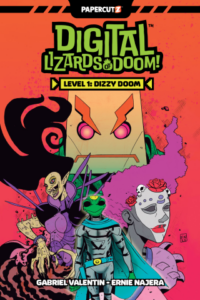 There is a lot going on in the universe Digital Lizards of Doom (DLOD) takes place in. Narrator Pineapple Pete opens the story like a video game, asking readers to help navigate the impending journey. Characters are swiftly introduced, along with the story’s premise and setting in a style that young readers will immediately recognize and connect with. Ancient witches, evil robots, ridiculous puns, fourth wall breaks — with young Dizzy Doom at the center of it all. A warrior charged with protecting his home planet, Dizzy dreams of bigger adventures and the opportunity to help more people. He is given a chance when his people are attacked by the evil commander EKO, and the adventure that follows has twists and turns that will challenge everything Dizzy thought he knew.
There is a lot going on in the universe Digital Lizards of Doom (DLOD) takes place in. Narrator Pineapple Pete opens the story like a video game, asking readers to help navigate the impending journey. Characters are swiftly introduced, along with the story’s premise and setting in a style that young readers will immediately recognize and connect with. Ancient witches, evil robots, ridiculous puns, fourth wall breaks — with young Dizzy Doom at the center of it all. A warrior charged with protecting his home planet, Dizzy dreams of bigger adventures and the opportunity to help more people. He is given a chance when his people are attacked by the evil commander EKO, and the adventure that follows has twists and turns that will challenge everything Dizzy thought he knew.
Each chapter in this collection concludes with Pineapple Pete summarizing the previous events, setting up the next one, and asking the reader questions that promote reading comprehension and careful examination of the text. In addition to the engaging story and worldbuilding, DLOD’s narrative structure lends itself to use in classrooms, too. Designed for digital natives, the pages feature a text chat style layout that mirrors familiar platforms, while characters’ faces display feelings that look similar to common emojis, helping readers understand context. While full of action, there is no realistic or graphic violence, and conversations between characters are appropriate for middle grade readers.
Part of a series, with a third installment coming in 2025, DLOD isn’t just a single story — it’s an entire universe for readers to explore. Be sure to stick around for the post-ending “credits” where Pete gives a sneak preview of the next volume, ensuring readers are excited for more to come.
- Comics Plus Collection(s): Middle School, High School, Teen Public Library, All-Access for Schools, Full Collection
Honorable Mentions
Clock Striker Vol. 1 (Saturday AM); Needle and Thread (Mad Cave); Sensory: Life on the Spectrum: An Autistic Comics Anthology (Andrews McMeel).
Step by Bloody Step: A Wordless Fantasy by Si Spurrier, Matias Bergara, and Matheus Lopes (Image Comics)
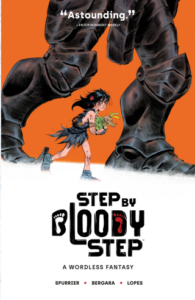 Born as we all are, helpless and sleepy, a child opens her eyes to an already tumultuous world. Her caretaker, an armored giant, swiftly dispatches the first immediate threat: a huge, yellow-eyed and ravenous wolf. From here, readers are off and walking the harsh snowy landscape with the two unnamed characters in this wordless adventure.The violence of this first terrifying encounter is contrasted by the girl, tiny and nude in the snow, reaching for a beautiful red and orange flower. This image is in stark contrast to the freezing black and blue landscape, both exchanges shown simultaneously in a reflection from the freezing lake. The relationship between them grows in a meaningful and relatable way, as the giant struggles to keep a gregarious, growing young woman both safe and entertained. The two endeavor on a series of fantastical adventures, portrayed by Bergara and Lopes’ eye-popping artwork that invites readers to pay attention to every gorgeous detail.
Born as we all are, helpless and sleepy, a child opens her eyes to an already tumultuous world. Her caretaker, an armored giant, swiftly dispatches the first immediate threat: a huge, yellow-eyed and ravenous wolf. From here, readers are off and walking the harsh snowy landscape with the two unnamed characters in this wordless adventure.The violence of this first terrifying encounter is contrasted by the girl, tiny and nude in the snow, reaching for a beautiful red and orange flower. This image is in stark contrast to the freezing black and blue landscape, both exchanges shown simultaneously in a reflection from the freezing lake. The relationship between them grows in a meaningful and relatable way, as the giant struggles to keep a gregarious, growing young woman both safe and entertained. The two endeavor on a series of fantastical adventures, portrayed by Bergara and Lopes’ eye-popping artwork that invites readers to pay attention to every gorgeous detail.
The intensity and violence of the visuals, along with the comprehension skills needed to “read” them, makes this one most appropriate for older teens. Bergara’s page layouts play with the boundaries of comics panels in a compelling way, and readers get to watch the girl grow up and have coming of age moments, while the chaos of the fantasy world ensues around her. Backmatter includes “Script to Art,” revealing how story creator Si Spurrier laid out the script to guide Bergara’s illustrations. This offers an interesting insight into the behind the scenes work that goes into a non-traditional style of graphic novel.
NOTE: Wordless graphic novels represent a whole different opportunity to explore the places that comics can go that regular prose can’t follow. Other notable wordless titles include A Difficult Thing (Ablaze) and Light (Oni Press); Monsters! and Other Stories (Dark Horse) Internal Wilderness (Avery HIll); and One Beautiful Spring Day (Fantagraphics).
- Comics Plus Collection(s): High School, Teen Public Library, All-Access for Schools, Full Collection
Honorable Mentions
Amazona (Lerner); Chef’s Kiss (Oni Press); Ripple Effects: Deluxe Edition (Fanbase Press); The Summer Hikaru Died Vol. 1 (Yen Press).
Adults
Did You Hear What Eddie Gein Done? by Eric Powell (Dark Horse)
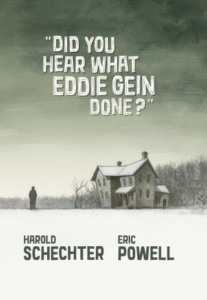 Norman Bates. Leatherface. Buffalo Bill. These and many other chill-inducing fictional serial killers were all inspired by the true crimes of Edward Theodore Gein. The reality of his background as portrayed in Did You Hear What Eddie Gein Done is quieter and chill-inducing in more subtle ways, like watching as a train slowly chugs into a head-on crash.
Norman Bates. Leatherface. Buffalo Bill. These and many other chill-inducing fictional serial killers were all inspired by the true crimes of Edward Theodore Gein. The reality of his background as portrayed in Did You Hear What Eddie Gein Done is quieter and chill-inducing in more subtle ways, like watching as a train slowly chugs into a head-on crash.
The grim tale opens in 1957 when local Plainfield, Wisconsin authorities are digging up graves to assess whether Gein actually murdered his victims, or simply desecrated existing corpses, as he first claimed. From there, readers are shown a private home in Plainfield in 1906, where Augusta Gein is on her knees, tearfully giving birth while praying that this child will be a girl, thus curing her loneliness. After Eddie is born, his mother’s disappointment hangs over every aspect of his life. Where Augusta is overbearing and cruel, his father George is absent, choosing liquor over his responsibilities. The entire story of Eddie’s upbringing is an unfortunate recipe for how to raise a future serial killer. Readers are spared graphic depictions of abuse and assault, a small but appreciated detail when so many even more disturbing accounts of Gein exist. Gein’s story is also framed by the true tale of Alfred Hitchcock’s path to getting Psycho made — also famously inspired by Eddie’s crimes and mommy obsession. This one will not be for every reader, but rest assured there are plenty of true crime enthusiasts who will be hooked.
While there is a glut of true crime content — ranging from dramatized depictions, court procedurals, and numerous documentaries — Powell’s take on Gein’s story is comparatively quiet. It strikes a balance with an unflinching yet not overly sensationalized handling of the killer’s most grotesque formative moments, leaving the reader uneasy yet unable to look away. Overall,it is well-researched, focused on Gein’s childhood to examine the “why” of his crimes. It’s also presented in black and white, which is a nice touch for maintaining the historical atmosphere and removing some of the sting from Powell’s depictions of gorier scenes.
The true crime element makes this an engaging title, even for non-comics readers, and has the depth needed for a book club candidate. Provided participants are aware of the numerous potential triggers, discussions could range from facts about Gein’s crimes to the various popular culture stories and characters he inspired. Dark Horse has more notable titles for true crime enthusiasts, including The Butcher of Paris, From Hell, Green River Killer, and Torso.
- Comics Plus Collection: Full Collection
Honorable Mentions
Beneath the Trees Where Nobody Sees (IDW); A Boy Named Rose (FairSquare Graphics); Sleeping While Standing (Avery Hill); White Ash Vol. 1 (White Ash Comics).
Read All The Comics!
“An absolute game changer.” School Library Journal
With Comics Plus, schools and libraries can offer readers unlimited access to thousands of digital comics, manga, and picture books from popular publishers like ABDO, Andrews McMeel, BOOM! Studios, Capstone, Cherry Lake, Dark Horse, Europe Comics, Fantagraphics, Humanoids, Image Comics, Kodansha, Lerner, Mad Cave, Manga Classics, Oni Press, Papercutz, Tokyopop, TOON Books, UDON Entertainment, Yen Press, and dozens more.
No holds, wait lists, or monthly borrowing limits—all at a price that won’t break your materials budget.
Learn more at comicsplusapp.com and sign up for a free demo account.
_____
Moni Barrette, MLIS is the Director, Collection Development for LibraryPass, as well as former President of American Library Association’s Graphic Novel & Comics Round Table, and co-founder of the nonprofit Creators, Assemble! Inc. As a former public library manager, Moni won the California Library Association PRExcellence Award (2018 & 2019) for library events aimed at underserved adult library users, and has proven success using comics to increase library circulation. She is a frequent panelist at San Diego and New York Comic Con, San Diego Comic Fest and Wonder-Con, hosting industry networking events and providing instruction to educators and librarians.

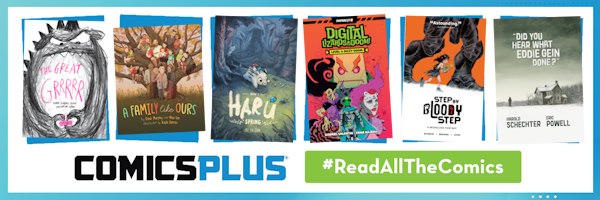

 We curate high-interest, immersive digital content that helps schools and libraries expand and diversify their collections—without breaking their materials budgets.
We curate high-interest, immersive digital content that helps schools and libraries expand and diversify their collections—without breaking their materials budgets.
